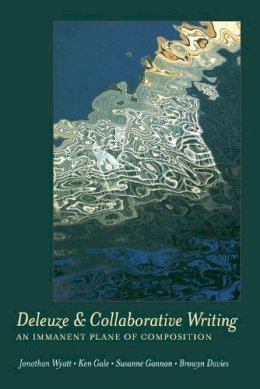
Stock image for illustration purposes only - book cover, edition or condition may vary.
Deleuze and Collaborative Writing: An Immanent Plane of Composition
Jonathan Wyatt
FREE Delivery in Ireland
Description for Deleuze and Collaborative Writing: An Immanent Plane of Composition
Paperback. Deleuze and Collaborative Writing Series: Complicated Conversation. Num Pages: 146 pages. BIC Classification: CJCK; HPCF3; HPK; JNA. Category: (P) Professional & Vocational. Dimension: 151 x 224 x 8. Weight in Grams: 240.
This book is a passionate engagement with Gilles Deleuze and collaborative writing, in which four writers explore together the insights that Deleuze has contributed to the topic. This powerful and complex text, which will appeal to scholars within qualitative inquiry, investigates the question of how we might begin to write, together, on what Deleuze would call an immanent plane of composition. On such a Deleuzian plane, or plateau, the writers seek to bond with Deleuze, to open up with him a new stream of thought and of being.
Product Details
Publisher
Peter Lang Publishing Inc
Series
Complicated Conversation
Place of Publication
, United States
Shipping Time
Usually ships in 15 to 20 working days
About Jonathan Wyatt
Jonathan Wyatt, Ed.D., is the head of professional development at the Oxford Learning Institute, a research fellow at the Department of Education, University of Oxford, and a counselor in primary care within the National Health Service. He is interested in the performative and collaborative writing and autoethnography of life and loss. Ken Gale, Ed.D., is a lecturer in education ... Read moreworking in the Faculty of Education at the University of Plymouth in the United Kingdom. His particular teaching interests are located within the philosophy of education, poststructural theory, and the application of narrative and autoethnographic approaches in education research. His research interests focus on the theory and practice of collaborative and performative writing practices as methods of inquiry and how these might be applied to areas of subjectivity, friendship, gender studies, and in education studies and professional development. Susanne Gannon, PhD, is an associate professor in the School of Education at the University of Western Sydney, Australia. Much of her work demonstrates her continuing interest in tracing the impact and effects of poststructural theories on writing practices. Bronwyn Davies, PhD, is an independent scholar based in Sydney, Australia. She is also a professorial fellow at the University of Melbourne. The distinctive features of her work are her development of innovative social science research methodologies incorporating elements of the visual, literary, and performative arts on the one hand and its strong base in the conceptual work of poststructuralist philosophers such as Butler, Deleuze, and Foucault on the other. Show Less
Reviews for Deleuze and Collaborative Writing: An Immanent Plane of Composition
«This four-voiced engagement with Deleuze brilliantly moves collaborative writing into new spaces. The text explores uncharted topics, including all the transgressive poetic places between ontology, ethics, and nightmares. In (these authors’) hands, writing becomes more than a method of inquiry, it is a way of being in the world. And once you enter this space, you can never go back.» ... Read more(Norman K. Denzin, Distinguished Professor of Communications, University of Illinois at Urbana-Champaign) «This is a delirious book, in the best possible sense, and a vivid and accessible engagement with the work of Deleuze. It is a mix of memoire, travelogue, philosophical exploration, pedagogical text and, near its conclusion, heart-stopping thriller. But of course it is none of these exactly. ‘JKSB’ shakes up cosy, humanist notions of collaborative writing, opening it up to something altogether more dangerous, fragile and promising.» (Maggie MacLure, Professor, Institute of Education, Manchester Metropolitan University, United Kingdom) «This unusual book takes you on a collaborative writing journey alongside the ideas and conceptualisations generated by Deleuze. It makes for an edgy and compelling read that is not so much ‘about’ Deleuzian theory (although much thoughtful theoretical insight is shared) as about ‘hanging out’ alongside a group of hugely enthusiastic writers whose expressions of life and practices of living and working simply exude and exemplify Deleuzian ideas. It is also an unexpectedly intimate book that both touches the heart and moves on swiftly leaving you wanting more. I couldn’t put it down.» (Jane Speedy, Reader in Qualitative Inquiry, University of Bristol, United Kingdom) «This four-voiced engagement with Deleuze brilliantly moves collaborative writing into new spaces. The text explores uncharted topics, including all the transgressive poetic places between ontology, ethics, and nightmares. In (these authors’) hands, writing becomes more than a method of inquiry, it is a way of being in the world. And once you enter this space, you can never go back.» (Norman K. Denzin, Distinguished Professor of Communications, University of Illinois at Urbana-Champaign) «This is a delirious book, in the best possible sense, and a vivid and accessible engagement with the work of Deleuze. It is a mix of memoire, travelogue, philosophical exploration, pedagogical text and, near its conclusion, heart-stopping thriller. But of course it is none of these exactly. ‘JKSB’ shakes up cosy, humanist notions of collaborative writing, opening it up to something altogether more dangerous, fragile and promising.» (Maggie MacLure, Professor, Institute of Education, Manchester Metropolitan University, United Kingdom) «This unusual book takes you on a collaborative writing journey alongside the ideas and conceptualisations generated by Deleuze. It makes for an edgy and compelling read that is not so much ‘about’ Deleuzian theory (although much thoughtful theoretical insight is shared) as about ‘hanging out’ alongside a group of hugely enthusiastic writers whose expressions of life and practices of living and working simply exude and exemplify Deleuzian ideas. It is also an unexpectedly intimate book that both touches the heart and moves on swiftly leaving you wanting more. I couldn’t put it down.» (Jane Speedy, Reader in Qualitative Inquiry, University of Bristol, United Kingdom) Show Less

